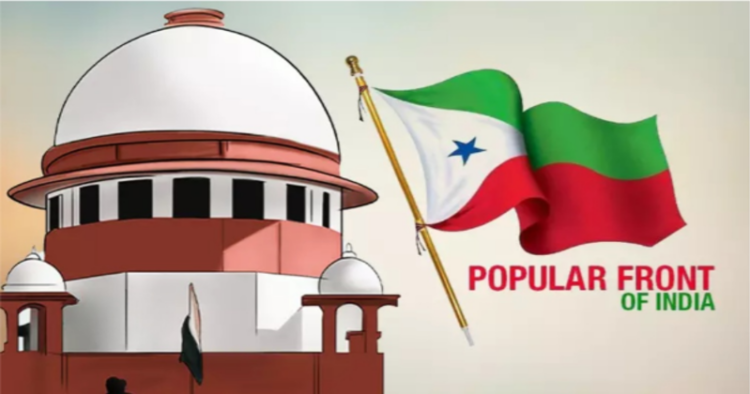In a significant legal setback for the banned Popular Front of India (PFI), the Supreme Court has overturned the Madras High Court’s decision to grant bail to eight PFI members. The apex court ordered the immediate return of the accused to jail, underscoring the seriousness of the charges against them under the Unlawful Activities (Prevention) Act (UAPA).
The National Investigation Agency (NIA) arrested the eight individuals in September 2022, following intelligence that suggested PFI members were conspiring to organise terrorist activities across several Indian states, including Kerala, Tamil Nadu, and Uttar Pradesh. Despite a special court denying bail in January, the Madras High Court later granted bail, prompting the NIA to appeal to the Supreme Court.
The Madras High Court had previously noted that while the NIA charged the appellants with collecting funds for terrorist acts, there was insufficient evidence directly linking them to such activities. The court pointed out that the possession of documents, including “pictures with markings” of RSS leaders and other Hindu organisations, did not conclusively prove their involvement in terrorism.
However, the NIA argued that the High Court’s decision was flawed and did not adequately consider the gravity of the allegations. The agency presented evidence indicating that the accused were involved in recruiting members, imparting training for terrorist activities, and organising mass drills to display their combat readiness. The NIA claimed these actions were part of a larger plan to instill fear and insecurity among other religious communities and ultimately establish a Sharia-ruled state by 2047.
Organiser E- poll – Whom will you vote for
A bench comprising Justices Bela M Trivedi and Pankaj Mithal sided with the NIA, criticising the High Court for not assessing the evidence correctly. They stated that the High Court had committed a “gross error” and recorded a “perverse finding” by concluding there was no material to suggest the commission of any offence.
The NIA had arrested the eight individuals in September 2022, claiming that they were part of a conspiracy to organize terrorist acts in various states, including Kerala, Tamil Nadu, and Uttar Pradesh. A special court denied them bail in January, but the Madras High Court later granted bail, prompting the NIA to appeal to the Supreme Court.
The Supreme Court bench, comprising Justices Bela M Trivedi and Pankaj Mithal, found that the High Court had committed a “gross error” by not properly considering the evidence. The bench emphasized the seriousness and gravity of the alleged offenses, the previous criminal history of the respondents, the short period of custody they had undergone, and the severity of the punishment prescribed for the alleged offenses.
The court stated, “Having regard to the seriousness and gravity of the alleged offenses, previous criminal history of the respondents as mentioned in the charge-sheet, the period of custody undergone by the respondents being hardly one and a half years, the severity of punishment prescribed for the alleged offenses and prima facie material collected during the course of investigation, the impugned order passed by the High Court cannot be sustained. We are conscious of the legal position that we should be slow in interfering with the order when the bail has been granted by the High Court; however, it is equally well-settled that if such an order of granting bail is found to be illegal and perverse, it must be set aside.”
The bench strongly criticised the High Court’s findings, stating, “Such perverse findings of the High Court deserve to be strongly deprecated more particularly when the appellant has not alleged the offence under Section 15 of UAPA either in the FIR or in the charge sheet against the respondents. The alleged offenses are under Sections 18, 18A, 18B, etc. For the purpose of considering the offence under Section 18, the commission of a terrorist act as contemplated in Section 15 of UAPA is not required to be made out.”
The Supreme Court was satisfied with the charge sheet and other material provided by the NIA, stating that there are reasonable grounds to believe the accusations against the respondents are prima facie true. This satisfies the conditions under the proviso to Section 43(D)(5) of the UAPA, which justifies not releasing the respondents on bail.
The court concluded, “The UAPA is one of such Acts which has been enacted to provide for effective prevention of certain unlawful activities of individuals and associations and to deal with terrorist activities, as also to impose reasonable restrictions on the civil liberties of the persons in the interest of the sovereignty and integrity of India.”
The ruling highlights the Supreme Court’s stance on prioritising national security and combating terrorism while balancing civil liberties.




















Comments